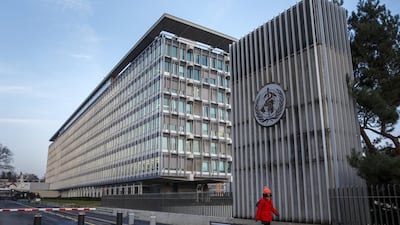Leading medical experts warned the American withdrawal from the World Health Organisation could lead to a resurgence of global diseases.
It will also leave the WHO with a deep hole in its finances, because the US provided almost a quarter of assessed fees and a voluntary contribution of $656 million (Dh2.4 billion).
President Donald Trump's announcement that the US would begin formal proceedings to pull out led to the last-minute cancellation of meetings by WHO officials to deal with the crisis.
The decision has caused an outcry at a time when the world is in the middle of a frightening surge in coronavirus infections, with the US reporting a record of almost 400,000 new cases in the past week.
America has provided the WHO with money and expertise for programmes to help eradicate polio, HIV, hepatitis and tuberculosis.
Prof David Heymann, an infectious diseases expert who worked for the world body from 1995 to 2003, said Mr Trump’s decision could have a serious effect on immunisation programmes.
“The WHO will struggle to keep its surveillance activities going, which are necessary to identify where polio is occurring and where it needs to be stamped out,” Prof Heymann told an online seminar run by Chatham House.
“The WHO has been able to work in these countries that are problem countries for US politics, but which are important in the global fight against infectious diseases.”
Dr Tedros Adhanom Ghebreyesus, director general of the WHO, cancelled his appearance at the seminar to deal with the situation.
Dr David Nabarro, the WHO’s special Covid-19 envoy for Europe, said the US financing and experts would be difficult to replace.
“It just seems really unfortunate that the most important country, in terms of size of the WHO budget, has decided to pull out,” Dr Nabarro told the BBC.
“I’m really sad also for the American people who I’m sure, by and large, want to be part of the global response and will be a bit confused about why this has happened.”
Globally, there are more than 12 million cases recorded and daily infections now exceed 200,000.
Dr Nabarro warned of a “massive health crisis” that will “get much worse in the next six months”.
“All world leaders and all world nations must work together to deal with this virus,” he said.
America has already passed 3 million cases and the virus is accelerating.
Mr Trump's handling of the crisis has been severely criticised and could affect his chances of re-election at the November presidential poll.
In trying to appeal to "America First" voters, he has now begun the formal withdrawal from the WHO, accusing it of spreading disinformation from China and being under Beijing’s control.
China, which contributes 12 per cent of the WHO's assessed fees, rejects the claims.
There has been a negative reaction to the decision with some US states experiencing a shortage in hospital beds.
“It leaves Americans sick and America alone,” Democrat Senator Robert Menendez tweeted.
The US withdrawal process is expected to take at least a year and it will be expected to pay all of its outstanding debts.
The WHO, which has a budget about similar to that of a large US hospital, could make up the funding shortfall from other countries such as Germany, Prof Heymann said.










